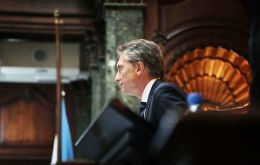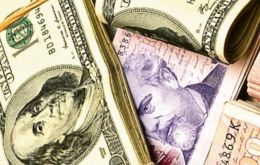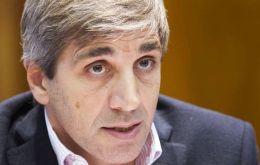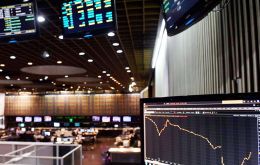MercoPress. South Atlantic News Agency
Tag: Mauricio Macri
-
Tuesday, May 15th 2018 - 06:54 UTC
Argentina's “L” Day challenge: US$ 25bn in Peso bonds mature on Tuesday

The Argentine Peso plummeted to a new low on Monday despite government attempts to curb losses in recent weeks by hiking interest rates and shedding billions in foreign reserves. The Peso fell sharply on opening Monday and closed down 6.2%, trading at 25.52 against the dollar, having lost close to 33% so far this year.
-
Tuesday, May 15th 2018 - 06:43 UTC
Argentine admits less growth and more inflation, but exports could be boosted with a dearer dollar

High interest rates will have a negative impact on activity, and the weaker peso resulting from a floating exchange rate regime will add to already sky-high inflation, but both are necessary to prevent a deeper crisis, Argentine Treasury Minister Nicolas Dujovne admitted on Monday.
-
Monday, May 14th 2018 - 08:20 UTC
The Economist: Will Argentina's woes spread?

Argentina has much in common with yesterday's emerging markets, but little in common with today's
-
Saturday, May 12th 2018 - 07:50 UTC
Macri enlists further financial and political support, but Peso continued to slide

Argentina’s central bank sold US$1.1 billion in the foreign exchange market on Friday and the peso weakened 2.74% to an all-time closing low of 23.35 per U.S. dollar despite talks aimed at securing an International Monetary Fund financing deal.
-
Friday, May 11th 2018 - 06:29 UTC
Argentine stock market climbs 6% and the exchange market operates cautiously

Argentine equities rallied on Thursday, while the country's peso currency was stable, as the central bank sold foreign currency reserves in the spot market for the first time since the country announced it was seeking financing from the IMF.
-
Friday, May 11th 2018 - 05:39 UTC
IMF and White House support Macri's economic reform program

International Monetary Fund chief Christine Lagarde said on Thursday she is ready to aid Argentina and wants talks on a financing package to be finalized quickly. Lagarde said she instructed the IMF team to continue discussions on a loan program with the goal to “reach a rapid conclusion.”
-
Thursday, May 10th 2018 - 08:20 UTC
Argentine congress passed capital market reform bill; Merval up 6%

The Argentine Congress passed the government's capital markets reform bill on Wednesday, seeking to boost a troubled economy by reducing the power of market regulators and loosening restrictions on some funds investing in Argentina. Investors and economists consider the reform bill key to President Mauricio Macri's effort to boost investment in the country, whose capital markets are far smaller than regional peers.
-
Wednesday, May 9th 2018 - 07:32 UTC
Peso storm: Argentina requests a US$ 30bn precautionary credit from IMF

Argentina asked the International Monetary Fund for financing to help stem a run from the Peso to the US dollar that is sparking a surge in interest rates and threatening to derail the country's economic recovery. The sum requested is estimated between 25 and 30bn dollars, 500% Argentina's IMF quota and could be disbursed in two forms, a flexible credit line or a precautionary credit line.
-
Tuesday, May 8th 2018 - 06:57 UTC
Argentine Peso: the worst of the storm seems to be over...for the time being

The Argentine Peso closed slightly weaker on Monday, though analysts remained optimistic the government and central bank had curbed a run on the currency with a massive rate hike and lower fiscal deficit target last week. . The local currency opened stronger on Monday but closed down 0.41%, at 21.97 per U.S. dollar. The Merval stock index ended down 3.43% and traders said investors remained cautious.
-
Monday, May 7th 2018 - 09:28 UTC
Argentina's storm: “Macri is not a political leader, he's a businessman”

“President Macri is not a political leader, he's a businessman, that's why he doesn't like to come out on national television; he should come closer to the people, he should be more political and less technical”. The comment belongs to Jorge Lanata probably the most outstanding investigative reporter in Argentina, and who heads the hate list of ex president Cristina Fernandez.
